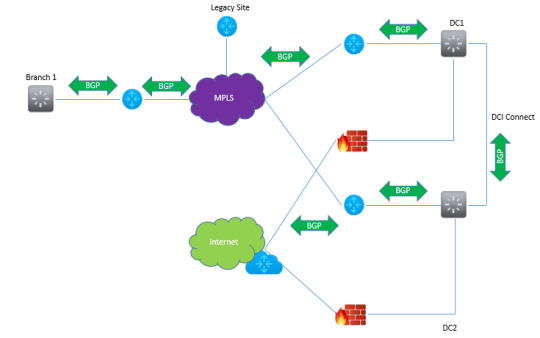#cloudnetwork
Explore tagged Tumblr posts
Text

Learn how to efficiently migrate to Velocloud SD-WAN with practical insights and best practices. https://www.dclessons.com/sd-wan-velocloud-network-migration
0 notes
Text
Ace Your Next Network Architect Interview: 2025 Edition

Looking to stand out in your next network architect interview? This insightful guide breaks down the top questions you’ll face, from technical fundamentals to cloud and automation. It’s a blend of expert advice, real-world examples, and a touch of humor—perfect for anyone aiming to level up their IT career.
Don’t miss the full article and explore more resources for tech professionals!
Full article: https://www.cvguys.in/post/top-network-architect-interview-questions More from CVGuys: https://www.cvguys.in
0 notes
Text

Social_Media_Nuclias
Easy management for you, fast connectivity for your customers Nuclias is a unified network management tool with cost-effective scalability, powerful controls, and is designed as a solution for every type of business.
#Nuclias#DLink#NetworkManagement#WiFiSolutions#BusinessConnectivity#ITInfrastructure#CloudNetworking#SmartNetworking#TechSolutions#DigitalTransformation#NetworkSecurity#ManagedNetworks#SeamlessConnectivity#BusinessTechnology#FastWiFi
0 notes
Text

Advanced AWS Concepts
#AdvancedAWS#AWSSecurity#AWSVPC#CloudNetworking#AWSDevOps#CICDonAWS#HighAvailability#DisasterRecoveryAWS#AWSArchitecture#SunshineDigitalServices
0 notes
Text
Cloud Networking Market Innovation Surges as Businesses Prioritize Scalable Secure Cloud Network Solutions
The cloud networking market is undergoing a significant transformation, driven by the increasing demand for scalable, agile, and cost-efficient networking solutions. Cloud networking refers to the use of cloud-based services and infrastructure to manage and deliver network functions such as connectivity, security, and performance management. As enterprises continue to embrace digital transformation, cloud networking has become a foundational component in achieving operational efficiency, innovation, and competitiveness.

Market Overview
The global cloud networking market has seen rapid growth in recent years. This expansion is primarily fueled by the proliferation of cloud-based applications, the shift towards hybrid and multi-cloud environments, and the rising need for improved network agility and automation. Organizations are moving away from traditional on-premises networking models and investing in cloud-native networking solutions that offer on-demand scalability and centralized control.
Key industry players such as Cisco, Amazon Web Services (AWS), Microsoft Azure, Google Cloud, and IBM are continuously innovating and expanding their cloud networking portfolios. These companies are integrating artificial intelligence (AI), machine learning (ML), and automation capabilities into their networking services, which has enhanced network visibility, threat detection, and overall performance.
Market Drivers
Several critical factors are propelling the growth of the cloud networking market:
Increased Adoption of Cloud Services: As more businesses migrate their workloads to the cloud, the demand for secure and reliable cloud networking infrastructure continues to rise.
Remote Work and BYOD Trends: The global shift to remote and hybrid work environments has underscored the need for scalable cloud networking that supports seamless access to resources from any location or device.
Edge Computing and IoT Integration: The rise of edge computing and Internet of Things (IoT) devices has led to the need for decentralized networking models, further increasing the demand for cloud-based network management tools.
Security and Compliance Requirements: Modern cloud networking solutions offer enhanced security features, including network segmentation, zero-trust models, and compliance monitoring, making them ideal for organizations in regulated industries.
AI and Automation Integration: The integration of AI and automation into cloud networking platforms is enabling predictive analytics, self-healing networks, and automated troubleshooting, which reduce operational costs and enhance user experiences.
Market Segmentation
The cloud networking market can be segmented based on:
Deployment Type: Public cloud, private cloud, and hybrid cloud.
Component: Solutions (e.g., SD-WAN, cloud routers, cloud firewalls) and services (e.g., consulting, integration).
Organization Size: Small and Medium Enterprises (SMEs) and large enterprises.
End-User Industry: IT & telecom, BFSI, healthcare, retail, manufacturing, and government.
Among these, the hybrid cloud deployment model is gaining significant traction due to its flexibility, scalability, and cost-efficiency. Additionally, the IT and telecom sector remains the largest consumer of cloud networking technologies, followed closely by the BFSI and healthcare sectors.
Regional Insights
North America currently dominates the cloud networking market, owing to the presence of leading technology providers and high adoption of cloud computing in the region. However, the Asia-Pacific (APAC) region is expected to witness the fastest growth during the forecast period, driven by rapid digitalization in countries like China, India, and Japan. Governments in these regions are also heavily investing in cloud infrastructure and smart city projects, further boosting market potential.
Challenges and Opportunities
Despite the numerous benefits, the cloud networking market faces several challenges. Data privacy concerns, legacy system integration, and complex compliance requirements continue to hinder seamless cloud network adoption. Additionally, ensuring consistent network performance across geographically distributed environments remains a critical issue.
However, these challenges also open up new opportunities. There is a growing market for cloud-native security tools, network analytics platforms, and interoperability solutions that address these pain points. Startups and niche players focusing on AI-driven cloud networking innovations are also expected to play a pivotal role in shaping the market's future.
Future Outlook
The future of the cloud networking market looks promising. As technologies like 5G, AI, and blockchain continue to evolve, they will reshape the way cloud networks are designed and managed. Enterprises will increasingly adopt software-defined networking (SDN) and network function virtualization (NFV) to improve network flexibility and reduce infrastructure costs.
By 2030, the cloud networking market is expected to become a central enabler of enterprise digital ecosystems, supporting innovations in everything from autonomous systems to immersive virtual environments. Organizations that invest in robust, secure, and intelligent cloud networking infrastructure today will be better positioned to thrive in the digital economy of tomorrow.
0 notes
Text
🌐 What is Network Engineering?
Network Engineering is the backbone of our connected world — from data centers to cloud computing, from Wi-Fi to global internet infrastructure. These engineers design, build, and manage networks that keep the world running.
Whether it’s securing data, optimizing speed, or ensuring 24/7 connectivity, Network Engineers are the unsung heroes of the digital age.
📡 Discover how they shape communication and innovation — read the full article now!
#NetworkEngineering#CyberInfrastructure#ITCareers#DataNetwork#InternetBackbone#EngineeringTheWeb#CloudNetworking#STEMCareers#DigitalWorld#ConnectivityExperts#EngineersHeaven#FutureOfIT
0 notes
Text

Simplifying Connectivity with Multi-Cloud Networking Software
0 notes
Text
Mastering Multi-Cloud Networking: Connecting Clouds with Confidence

As organizations increasingly adopt digital transformation strategies, the reliance on cloud services has surged dramatically. However, instead of choosing a single cloud provider, many enterprises are now leveraging multi-cloud Networking Software — using services from multiple cloud providers to optimize performance, reduce dependency, and enhance business agility. But with this approach comes a new challenge: managing seamless, secure, and efficient network connectivity across diverse environments. This is where Multi-Cloud Networking Software (MCNS) becomes crucial.
What is Multi-Cloud Networking Software?
Multi-Cloud Networking Software refers to solutions designed to provide unified network management, connectivity, and security across multiple public and private cloud platforms. Traditional networking tools often fall short in complex multi-cloud environments due to varying architectures, policies, and services from different providers like AWS, Azure, Google Cloud, and others.
MCNS platforms address this by abstracting the underlying complexity and providing a consistent network fabric that enables organizations to:
Connect disparate cloud environments
Manage traffic flows across clouds
Apply consistent security and compliance policies
Monitor and troubleshoot network performance
These capabilities help businesses achieve the flexibility and resilience they seek from multi-cloud deployments without sacrificing control or increasing operational overhead.
Key Features of Multi-Cloud Networking Software
Unified Network Visibility and Management Multi-cloud networking tools centralize visibility, enabling network administrators to monitor traffic across all cloud environments through a single dashboard. This holistic view is critical for identifying bottlenecks, enforcing policies, and ensuring compliance.
Secure Interconnectivity MCNS ensures encrypted, high-performance connections between different cloud platforms. It supports technologies like IPsec VPNs, virtual private clouds (VPCs), and cloud-native network functions, making cross-cloud communication secure and reliable.
Automated Policy Enforcement A major benefit of MCNS is the ability to define and enforce policies uniformly across all environments. Whether it’s access control, segmentation, or data governance, these policies can be programmed once and automatically propagated to all clouds.
Application-Aware Routing Some MCNS solutions provide intelligent routing capabilities based on application needs, user locations, or network conditions. This ensures optimal performance and uptime for critical workloads by dynamically adjusting paths in real-time.
Scalability and Agility Multi-cloud networking solutions are inherently designed to scale with cloud-native architectures. As workloads scale up or move across environments, the network automatically adapts without requiring manual reconfiguration.
Benefits for Enterprises
Operational Consistency: Enterprises gain a standardized approach to networking, making it easier to deploy and manage applications across clouds.
Enhanced Security: With centralized control and visibility, organizations can more effectively detect and respond to threats.
Cost Optimization: By selecting the best cloud provider for each workload and avoiding vendor lock-in, businesses can optimize their infrastructure costs.
Faster Time-to-Market: MCNS enables rapid deployment and scaling of applications, accelerating innovation and responsiveness.
Use Cases for Multi-Cloud Networking
Hybrid Cloud Integration MCNS helps integrate on-premises data centers with multiple cloud environments, ensuring seamless and secure connectivity.
Disaster Recovery and Business Continuity With consistent network policies and failover mechanisms across clouds, businesses can ensure high availability and resilience.
Global Application Delivery By leveraging multiple regions and clouds, companies can deliver low-latency experiences to users worldwide while maintaining network efficiency.
Cloud-Native Development Developers working in DevOps environments can benefit from a simplified network layer that supports microservices and container orchestration across clouds.
Market Trends and Future Outlook
The demand for multi-cloud networking solutions is expected to grow as more businesses shift toward distributed cloud strategies. Vendors are increasingly integrating AI and machine learning to enhance predictive analytics, anomaly detection, and automated troubleshooting. Edge computing and 5G are also driving new requirements for decentralized connectivity, which MCNS platforms are evolving to meet.
Moreover, companies like QKS Group are exploring innovative ways to offer end-to-end visibility, automation, and intelligence in complex multi-cloud infrastructures. These efforts are poised to shape the future of cloud networking by making it more autonomous, secure, and aligned with business outcomes.
Final Thoughts
In today’s fast-paced digital landscape, the network is no longer just a utility — it's a strategic asset. Multi-Cloud Networking Software empowers businesses to harness the full potential of multi-cloud environments without compromising on performance, security, or manageability. As the complexity of IT environments continues to grow, investing in the right MCNS platform is not just beneficial — it's essential for sustained innovation and competitiveness.
0 notes
Text
#cloudwifi#homenetworking#ispsolutions#networkoptimization#openwrt#plumealternative#routerarchitects#wifidesign#artificial intelligence#coding#hashtag#OpenWiFi hashtag#OpenWrt hashtag#uCentral hashtag#RouterArchitects hashtag#DisaggregatedNetworking hashtag#WiFiSolutions hashtag#WhiteboxRouters hashtag#TelecomInfraProject hashtag#OpenSourceWiFi hashtag#ISPs hashtag#SmartCities hashtag#CloudNetworking
0 notes
Link
0 notes
Text
#DigitalTransformation#CloudNetworking#MPLSSolutions#NetworkSecurity#IoTConnectivity#WANOptimization#NextGenNetworking#EnterpriseConnectivity#CloudIntegration#MPLSNetworking#DisasterRecovery#SecureConnections#NetworkManagement#MPLSCloud#ConnectivitySolutions
0 notes
Text



Unlock the benefits of VXLAN for scalable data center networks. Get hands-on experience in network virtualization. https://www.dclessons.com/category/courses/vxlan
0 notes
Text
🌐 Cloud Networking: The Future of Scalable and Secure Connectivity ☁️
Cloud networking is reshaping the way businesses connect and scale, offering unmatched flexibility, security, and cost efficiency. With real-time access and seamless integration, it enables organizations to boost productivity while ensuring robust data protection.
At Kanerika, we empower businesses with cutting-edge cloud networking solutions that enhance connectivity, streamline operations, and scale effortlessly.

#CloudNetworking#Scalability#BusinessGrowth#Security#DigitalTransformation#Kanerika#Innovation#TechSolutions
0 notes
Link
#SDWAN#Netzwerke#NetworkSolutions#CloudNetworking#SecureNetworks#WANOptimization#DigitalTransformation#EnterpriseNetworking#Connectivity#ITInfrastructure#VirtualNetworks#BandwidthManagement#NetworkSecurity#BusinessNetworking#TechInnovation
0 notes
Text
Top Networking Solutions in Toronto
In the modern digital era, businesses depend on reliable, efficient, and secure networking solutions to succeed. Whether it's a small startup or a large enterprise, having the right networking infrastructure can make all the difference in maintaining seamless communication, data transfer, and overall business productivity. Toronto, being a global hub of innovation and technology, offers an array of networking solutions to meet the growing demands of businesses. Acelaservices brings forth top networking solutions in Toronto, catering to the specific needs of every enterprise.
Why Networking Solutions are Crucial for Businesses
Enhancing Connectivity and Communication
One of the primary reasons businesses seek top networking solutions in Toronto is to enhance their internal and external communication systems. Whether it's through cloud-based networks or local area networks (LANs), businesses require robust connectivity to keep their teams connected, no matter where they are. A reliable network can ensure uninterrupted data flow, improved collaboration, and faster access to information, all of which are vital for day-to-day operations.
Secure Data Transfer and Storage
Protecting data is a critical concern for businesses today. With rising cyber threats and data breaches, companies are more vulnerable than ever. Top networking solutions in Toronto focus on providing end-to-end encrypted services that secure sensitive business information. These solutions implement firewalls, VPNs (Virtual Private Networks), and intrusion detection systems to ensure that all data, whether being transferred or stored, remains protected from unauthorized access.
Scalability and Flexibility
As businesses grow, so do their networking needs. One of the hallmarks of top networking solutions in Toronto is their scalability. Whether your company is expanding its workforce or opening a new office in another location, these networking services provide flexible solutions that adapt to your needs. Acelaservices offers customized networking plans that can be scaled up or down depending on business requirements, ensuring cost-effectiveness and efficiency.

What Are the Components of Top Networking Solutions?
Cloud Networking
Cloud networking allows businesses to access data and applications over the internet rather than relying on physical hardware. This solution is especially popular due to its cost-effectiveness, scalability, and ability to support remote workforces. Acelaservices provides top networking solutions in Toronto that include secure cloud networking, allowing businesses to access their data from anywhere while maintaining the highest security standards.
Virtual Private Networks (VPNs)
A VPN offers businesses secure access to their networks, especially when employees are working remotely. Top networking solutions in Toronto emphasize the importance of VPNs in protecting confidential business data by creating a secure tunnel for information to pass through. This ensures that even if your team is working from different parts of the globe, your business network remains safe from cyberattacks.
Network Monitoring and Management
Effective network management ensures that all systems are running optimally. Through real-time monitoring, businesses can detect and address potential issues before they escalate into significant problems. Acelaservices specializes in providing top networking solutions in Toronto, including proactive network monitoring, 24/7 support, and troubleshooting services. This results in minimal downtime, ensuring business operations continue without interruption.
Wireless Networking Solutions
In a world where mobility is key, wireless networking solutions have become an essential part of business operations. Wireless LANs (WLANs) enable employees to connect to the network from various devices, including laptops, tablets, and smartphones. Acelaservices delivers top networking solutions in Toronto that incorporate fast and secure wireless networks, designed to support high traffic and prevent connectivity issues.
How Acelaservices Stands Out
When it comes to offering top networking solutions in Toronto, Acelaservices goes beyond providing basic services. We understand the unique needs of different industries and customize solutions that fit each business model. Our team of networking experts ensures that your business remains connected, secure, and scalable. Here's why Acelaservices is a preferred choice:
Tailored Solutions: Every business has unique networking needs. Acelaservices works closely with clients to design, implement, and maintain networks that support their growth and security objectives.
Cutting-Edge Technology: Our networking solutions leverage the latest technologies in cybersecurity, cloud computing, and wireless networking to deliver the best results.
24/7 Support: Our dedicated team offers round-the-clock support to monitor, manage, and resolve any network issues that may arise, ensuring minimal disruptions to your business operations.
Conclusion
In the fast-paced business environment of Toronto, having the right networking infrastructure can determine the success or failure of an organization. Acelaservices is proud to provide top networking solutions in Toronto that cater to businesses of all sizes. From cloud networking to VPNs, wireless networking, and network management, we cover all aspects of networking to ensure businesses operate smoothly, securely, and efficiently.
Invest in the best networking solutions for your business with Acelaservices, and experience seamless connectivity, robust security, and scalability that grows with your enterprise.
FAQs
1. What are the benefits of cloud networking?
Cloud networking provides flexibility, scalability, and cost-effectiveness, allowing businesses to access data remotely while maintaining security.
2. How does Acelaservices ensure data security in networking solutions?
We implement advanced encryption, firewalls, and VPNs to ensure that all data transfers and storage are secure from cyber threats.
3. Why is network monitoring important?
Network monitoring allows for real-time detection and resolution of issues, ensuring minimal downtime and efficient operations.
By choosing Acelaservices, your business will receive the top networking solutions in Toronto, tailored to your specific needs, ensuring robust connectivity and security at all times.
FOR MORE INFORMATION
𝐄𝐦𝐚𝐢𝐥:[email protected]
𝐩𝐡𝐨𝐧𝐞 𝐧𝐮𝐦𝐛𝐞𝐫: +1 (647) 534-3589 | Canada
+91 9849494893 | India
𝐀𝐝𝐝𝐫𝐞𝐬𝐬: 3422 Fountain Park Ave Mississauga ON L5M7E3
𝐰𝐞𝐛𝐬𝐢𝐭𝐞: www.acela-services.com
#NetworkingSolutions#TorontoBusiness#SecureNetworking#BusinessConnectivity#Acelaservices#CloudNetworking#VPNServices#NetworkSecurity#WirelessNetworking#TorontoTech
0 notes
Text
Cloud Networking Market Opportunities Arise from AI Automation and Network-as-a-Service Models
The cloud networking market is witnessing rapid growth as organizations across the globe embrace cloud technologies to enhance their IT infrastructure, improve scalability, and reduce operational costs. Cloud networking, which integrates cloud computing with networking solutions, enables businesses to manage their networks through cloud-based services, offering flexibility, efficiency, and improved security. As digital transformation accelerates, cloud networking is becoming a critical enabler for businesses aiming to stay competitive and agile in today’s fast-paced environment.

Market Overview
Cloud networking involves the delivery of networking services—such as virtual networks, software-defined networking (SDN), and network functions virtualization (NFV)—via cloud platforms. Unlike traditional networking, cloud networking abstracts hardware management, allowing companies to configure and control networks remotely through centralized management portals.
The cloud networking market has expanded rapidly due to the growing adoption of hybrid and multi-cloud environments, which combine public clouds, private clouds, and on-premises infrastructure. This hybrid approach demands seamless network integration across diverse environments, pushing demand for cloud networking solutions that simplify network orchestration and optimize performance.
Key Drivers
Several factors are driving the growth of the cloud networking market:
Increasing Cloud Adoption: Businesses worldwide are migrating their IT workloads to cloud platforms such as Amazon Web Services (AWS), Microsoft Azure, and Google Cloud. This migration necessitates robust cloud networking to ensure secure and efficient data flow.
Need for Scalability and Flexibility: Cloud networking offers the ability to scale resources dynamically based on demand. Companies benefit from reducing the need for costly hardware investments and gain the flexibility to adjust network capacity during peak periods.
Digital Transformation Initiatives: Enterprises embracing digital technologies—such as IoT, AI, and big data analytics—require highly responsive and flexible networks. Cloud networking supports these initiatives by enabling real-time data processing and rapid deployment of network resources.
Cost Efficiency: By shifting to cloud-based networking, organizations reduce the costs associated with maintaining physical network infrastructure. Pay-as-you-go pricing models and reduced hardware dependency make cloud networking economically attractive.
Remote Work Trends: The surge in remote working, accelerated by the COVID-19 pandemic, has heightened the need for reliable and secure cloud networking solutions that support remote access and connectivity for distributed workforces.
Market Segmentation
The cloud networking market can be segmented based on components, deployment models, end-users, and geography.
Components: This includes hardware, software, and services. Software solutions, especially SDN and NFV, hold significant market share due to their role in virtualizing and automating network functions.
Deployment Models: Public cloud, private cloud, and hybrid cloud. Hybrid cloud deployment is gaining momentum because it offers a balanced approach between control and flexibility.
End-Users: Various industries such as IT and telecom, BFSI (banking, financial services, and insurance), healthcare, retail, and manufacturing are major adopters of cloud networking technologies.
Geography: North America currently dominates the cloud networking market owing to its advanced technological infrastructure and early adoption of cloud services. However, regions like Asia-Pacific are expected to witness the fastest growth due to increasing digitalization and expanding cloud infrastructure.
Challenges
Despite its benefits, the cloud networking market faces challenges:
Security Concerns: Cloud networking involves transmitting sensitive data across the internet, raising issues related to data privacy and cyber threats. Ensuring secure cloud network architecture is paramount.
Complexity in Integration: Integrating cloud networking solutions with legacy systems can be complex and may require significant planning and expertise.
Regulatory Compliance: Compliance with regional data protection laws can complicate the deployment of cloud networking solutions, especially in industries handling sensitive information.
Emerging Trends
Several trends are shaping the future of cloud networking:
5G Integration: The rollout of 5G networks will significantly enhance cloud networking capabilities by providing faster speeds, lower latency, and increased capacity, which will support next-gen applications like augmented reality and autonomous vehicles.
Edge Computing: Moving computation closer to data sources helps reduce latency. Cloud networking combined with edge computing will enable real-time analytics and faster decision-making.
AI and Automation: Artificial intelligence is being leveraged to automate network management, detect anomalies, and optimize performance, making cloud networks more self-sufficient and resilient.
Network-as-a-Service (NaaS): NaaS models are gaining traction, allowing businesses to lease network infrastructure and services on demand, further enhancing flexibility and reducing capital expenditure.
Conclusion
The cloud networking market is poised for significant growth as organizations seek to leverage the advantages of cloud-based networking solutions. With the rise of hybrid cloud strategies, growing demand for scalable and flexible networks, and advances in technologies like 5G and AI, cloud networking is transforming how businesses operate and connect in the digital age. Despite some challenges related to security and integration, the benefits far outweigh the risks, making cloud networking a critical component of modern IT infrastructure.
#CloudNetworking#CloudComputing#NetworkingSolutions#DigitalTransformation#HybridCloud#5GTechnology#NetworkAutomation
0 notes